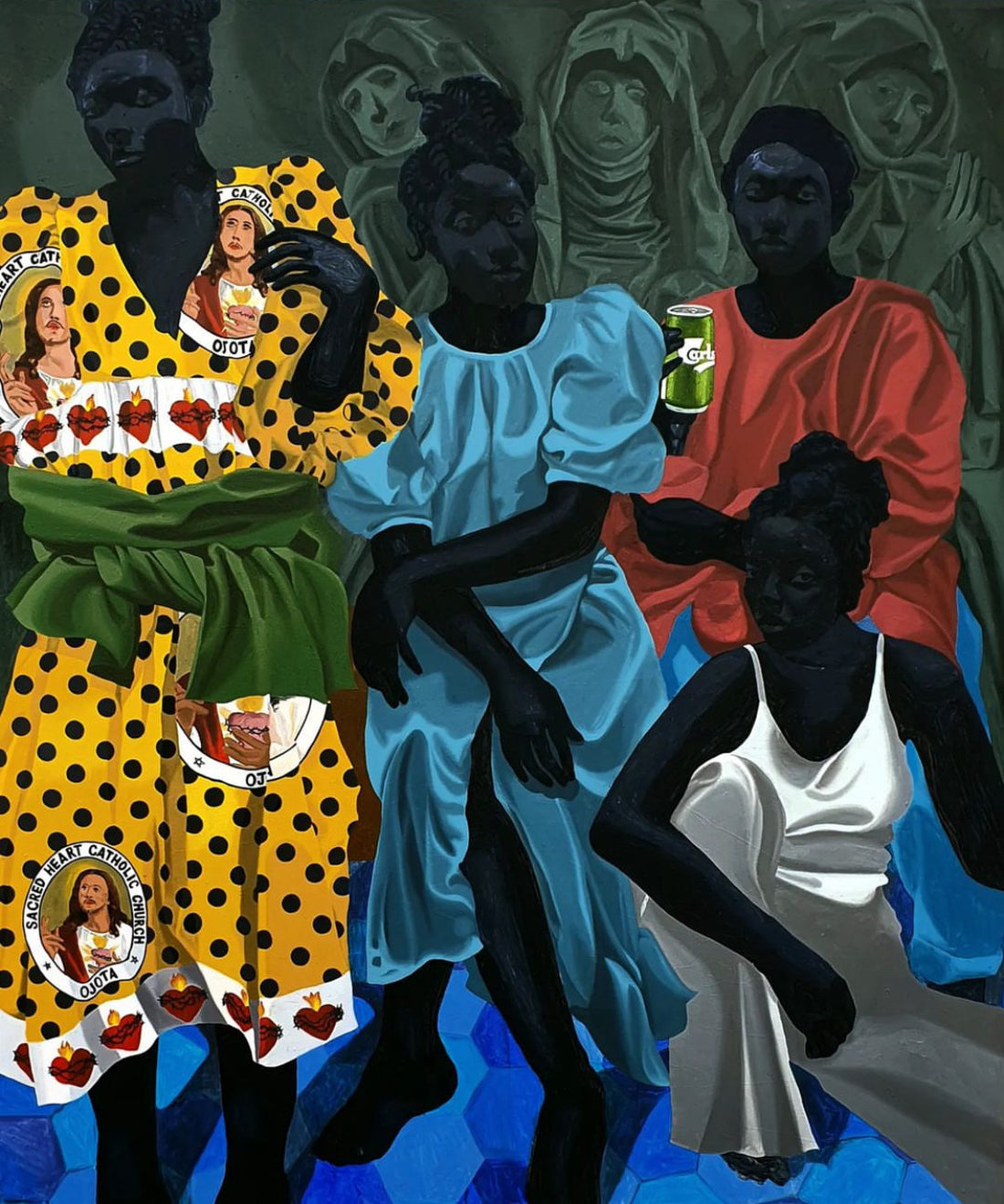
Painting patterned fabrics: the art of Tonia Nneji
Inside the walls of Berlin's Kristin Hjellegjerde are large portraits of women in different moods. A woman is sitting on a stool with hands clenched together and a saddened face. Another is standing with a dress falling loosely off her shoulders. A painting captures 3 women sitting together with their legs crossed and body language too playful to assume they’re in an interesting conversation. But in all of this, one thing sums these paintings– the fabrics, and the clothes these women wear are colourful and perhaps styled with a very small piece of fabric decorated with printed images of unseen people— this is the oeuvre of the Nigerian artist Tonia Nneji whose works usually confronts the relationship between trauma and the female body, addressing issues of sexual harassment, the culture of silencing women and the emotional and mental wellbeing of the feminine.

Born in Lagos, Nigeria to a line of traditional carvers and masquerade carriers, Nneji commemorates these long-lived practices with her approach to textile cultures, celebrating the importance of fabric and its cultural meanings in African societies, especially from her Indigenous Igbo tribe where fabric is seen as a celebratory item. All of her characters are clothed in this specific fabric: usually plain cotton with printed images of men or catholic saints or of church symbols and typically worn for religious functions. But the decision to elaborate on these rich patterned fabrics in her art also comes from Nneji acknowledging that clothing could be a form of entrapment rather than belonging. “We live in a society where people who pledge allegiance to a thing always want to show off that they belong to that group,” says Nneji. ‘It’s common to go to a particular church and see people wearing customised prints made by that church.” However she doesn’t want the women in her art to feel this sort of entrapment, she paints with a notion that they are rebellious of this system, giving them so much power to embrace themselves through very sensual portraits of women holding each other in warmth embrace to symbolise sisterhood and women with eased body language and cheering to symbolise liberty and celebration.
 Image: Tonia Nneji, 2024, Oil on canvas, 121 x 151 cm, 47 5/8 x 59 1/2 in. Copyright of the artist.
Image: Tonia Nneji, 2024, Oil on canvas, 121 x 151 cm, 47 5/8 x 59 1/2 in. Copyright of the artist.
In her latest exhibition at the Kristin Hjellegjerde titled ‘When Dusk Falls’ and co-exhibited with the American visual artist Jamie Luoto, Nneji explains how religion could influence the reasoning of people and how that could influence women’s physical health. She draws on her experiences of being diagnosed with polycystic ovary syndrome (PCOS) in 2014 and how her family members had urged her to attend church programs before medical assistance. “It was their understanding of life and I never faulted them for it,” she says, “but sadly in Nigeria and most of West Africa religion comes before medicine.” It’s these same reasons that explain the various poses and demeanour of the women in her newest paintings; those who are saddened by how society has failed them, or burdened by the crude advice of loved ones represent the woman whose dress is falling off her shoulders. In essence, Tonia Nneji empowers the female body by visibly showing their vulnerabilities and offering her character space to heal themselves from society’s excesses.
Text by Ugonnaora Owoh

Image: Whatever Brings Light, 2024, Oil on canvas, 165 x 136 cm, 65 x 53 1/2 in. Image above: Tonia Nneji, A Gathering of Broken Hearted, 2022, Acrylic and oil on canvas, 60 x 72 in, 152.4 x 182.9 cm. Copyright of the artist.
Born in Lagos, Nigeria to a line of traditional carvers and masquerade carriers, Nneji commemorates these long-lived practices with her approach to textile cultures, celebrating the importance of fabric and its cultural meanings in African societies, especially from her Indigenous Igbo tribe where fabric is seen as a celebratory item. All of her characters are clothed in this specific fabric: usually plain cotton with printed images of men or catholic saints or of church symbols and typically worn for religious functions. But the decision to elaborate on these rich patterned fabrics in her art also comes from Nneji acknowledging that clothing could be a form of entrapment rather than belonging. “We live in a society where people who pledge allegiance to a thing always want to show off that they belong to that group,” says Nneji. ‘It’s common to go to a particular church and see people wearing customised prints made by that church.” However she doesn’t want the women in her art to feel this sort of entrapment, she paints with a notion that they are rebellious of this system, giving them so much power to embrace themselves through very sensual portraits of women holding each other in warmth embrace to symbolise sisterhood and women with eased body language and cheering to symbolise liberty and celebration.

In her latest exhibition at the Kristin Hjellegjerde titled ‘When Dusk Falls’ and co-exhibited with the American visual artist Jamie Luoto, Nneji explains how religion could influence the reasoning of people and how that could influence women’s physical health. She draws on her experiences of being diagnosed with polycystic ovary syndrome (PCOS) in 2014 and how her family members had urged her to attend church programs before medical assistance. “It was their understanding of life and I never faulted them for it,” she says, “but sadly in Nigeria and most of West Africa religion comes before medicine.” It’s these same reasons that explain the various poses and demeanour of the women in her newest paintings; those who are saddened by how society has failed them, or burdened by the crude advice of loved ones represent the woman whose dress is falling off her shoulders. In essence, Tonia Nneji empowers the female body by visibly showing their vulnerabilities and offering her character space to heal themselves from society’s excesses.
Text by Ugonnaora Owoh
